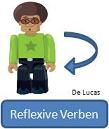In German, the infinitive of these reflexive verbs is preceded by the pronoun "sich" (sich streiten, sich freuen, etc.)

In a reflexive clause, the action is done to the person carrying out that same action. Reflexive clauses only can be formed by certain verbs. These verbs are called reflexive verbs and exist in German as well as English though there are far less of them in English.
In English, these verbs are characterized by using "oneself", "yourself", "ourselves", etc. In German, the infinitive of these verbs is preceded by the pronoun sich (sich streiten, sich freuen, etc.).
Reflexive verbs in German can be reflexive in the accusative or in the dative. This is not intuitive and needs to be memorized for each verb even though most reflexive verbs are accusative.
Depending on whether the verb is reflexive in the accusative or dative, it will use the corresponding reflexive pronouns:
| Accusative | Dative | |
|---|---|---|
| 1st Person Sing. | mich | mir |
| 2nd Person Sing. | dich | dir |
| 3 Persona Sing. | sich | sich |
| 1st Person Plural | uns | uns |
| 2nd Person Plural | euch | euch |
| 2nd Person Plural | sich | sich |
Ich freue mich auch für dich
I am also happy for you (accusative)
Ich kaufe mir eine Wohnung
I am buying myself an apartment (dative)
The most important reflexive verbs in the accusative are:
| Verb | Meaning |
|---|---|
| sich abkühlen | to cool down |
| sich abheben | to stand out |
| sich amüsieren | to have fun |
| sich ärgern | to get angry |
| sich bewegen | to move |
| sich ergeben | to give up |
| sich erholen | to recover, recuperate |
| sich freuen | to be happy |
| sich setzen | to sit down |
| sich sonnen | to sun |
| sich treffen | to meet |
| sich umwenden | to turn |
| sich verabschieden | to say goodbye |
| sich verfahren | to get lost |
The most common reflexive verbs in the dative are:
| Verb | Meaning |
|---|---|
| sich denken | to imagine |
| sich kaufen | to buy |
| sich etwas anziehen | to put something on |
Some reflexive verbs' behavior with parts of the body and items of clothing is interesting:
If a part of the body or item of clothing is named, they are reflexive in the dative:
Ich wasche mir die Haare
I wash my hair (dative)
But if a part of the body or item of clothing is not named, they are reflexive in the accusative:
Ich wasche mich
I wash myself (accusative)
The verb "kämmen" (to comb) is used the same way:
Ich kämme mir die Haare
I comb my hair (dative)
Which in the third person would be:
Er kämmt sie sich
He combs (his hair)
But if we do not say hair:
Ich kämme mich
I comb myself (accusative)
The reflexive pronoun is placed, like all pronouns, before the adverb nicht:
Du musst dich nicht kümmern
You don’t need to worry yourself